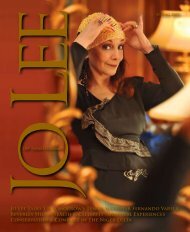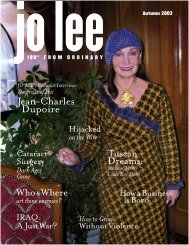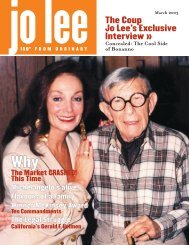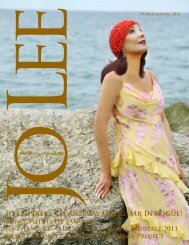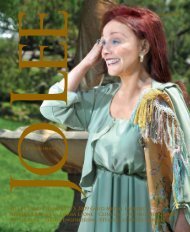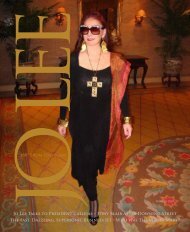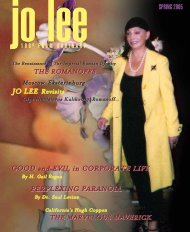WITS END - JO LEE Magazine
WITS END - JO LEE Magazine
WITS END - JO LEE Magazine
You also want an ePaper? Increase the reach of your titles
YUMPU automatically turns print PDFs into web optimized ePapers that Google loves.
POLITICALLY RED<br />
By<br />
Lani Silver<br />
San Francisco - California<br />
Lani Silver - historian, artist, free-lance writer, and Lecturer with the American<br />
Program Bureau. {Gorbachev’s bureau, Desmond Tutu, Betty Williams & Oscar<br />
Arias}. For 16 years, Lani directed San Francisco's landmark Holocaust Oral<br />
History Project, conducting l,700 oral histories with Holocaust survivors and<br />
witnesses. Lani and her partner, historian Eric Saul, discovered the story of Chiune<br />
Sugihara, who is called "The Japanese Schindler." Lani became Steven Spielberg's<br />
first consultant and trainer for his Survivors of the Shoah Visual History Foundation.<br />
54,000 testimonies. Lani is currently the Project Director for the James Byrd Jr.<br />
Racism Oral History Project. byrdfound@juno.com<br />
WOMEN<br />
PRO-PALESTINIAN AND PRO-ISRAELI<br />
AT THE SAME TIME<br />
Have you ever noticed on television and newspapers that<br />
when there are images of gatherings or rallies in Arab<br />
countries they’re all men? We see women when they are<br />
veiled and weeping. This got me thinking: where are all the<br />
women? So what does the role of women have to do with the<br />
Middle East crisis and what are the ramifications of their<br />
absence?<br />
First off, there aren’t many Middle Eastern women leaders,<br />
Arab or Israeli. Secondly, too many women are oppressed.<br />
Not only in Arab countries but everywhere. But more to the<br />
point here is what would be different, if we brought women’s<br />
voices to the table.<br />
What would women bring to the Middle East conflict if they<br />
were allowed to? What would be different? Women might<br />
well have the answer to the crisis.<br />
My point? Women could help. Gender roles have been<br />
politicized and entrenched in the Middle East and now the<br />
stakes are higher than ever. It appears to me that we are<br />
seeing male and female ways of managing conflict, and I’m<br />
not liking the male way so much these days. It’s all kind of<br />
scary and aggressive.<br />
Women have a nuance way of thinking about conflict, one<br />
that includes emotional realizations. Women’s views are<br />
textured. They talk about compromise and flexibility.<br />
Upheaval isn’t simple; people are not necessarily friends or<br />
foe. There are shades of gray.<br />
Compromise is effective and practical. Women pay attention<br />
to suffering. They don’t seem to be coming from anger or<br />
hate, as much. They’re empathetic. They understand all<br />
suffering.<br />
In fact, when I think about it, the wave of fundamentalism<br />
that has swept the globe is in large measure a reaction to the<br />
liberation of women and the excesses of capitalism. I<br />
understand part of it - we all recoil at certain excesses. But<br />
now we are left with an imperfect, tangled karmic loop,<br />
which has relegated women to a lesser role. It takes an open<br />
mind to be Pro-Palestinian and Pro-Israeli.<br />
Let’s correct that, while we can.<br />
94 <strong>JO</strong> <strong>LEE</strong><br />
SUMMER 2007






